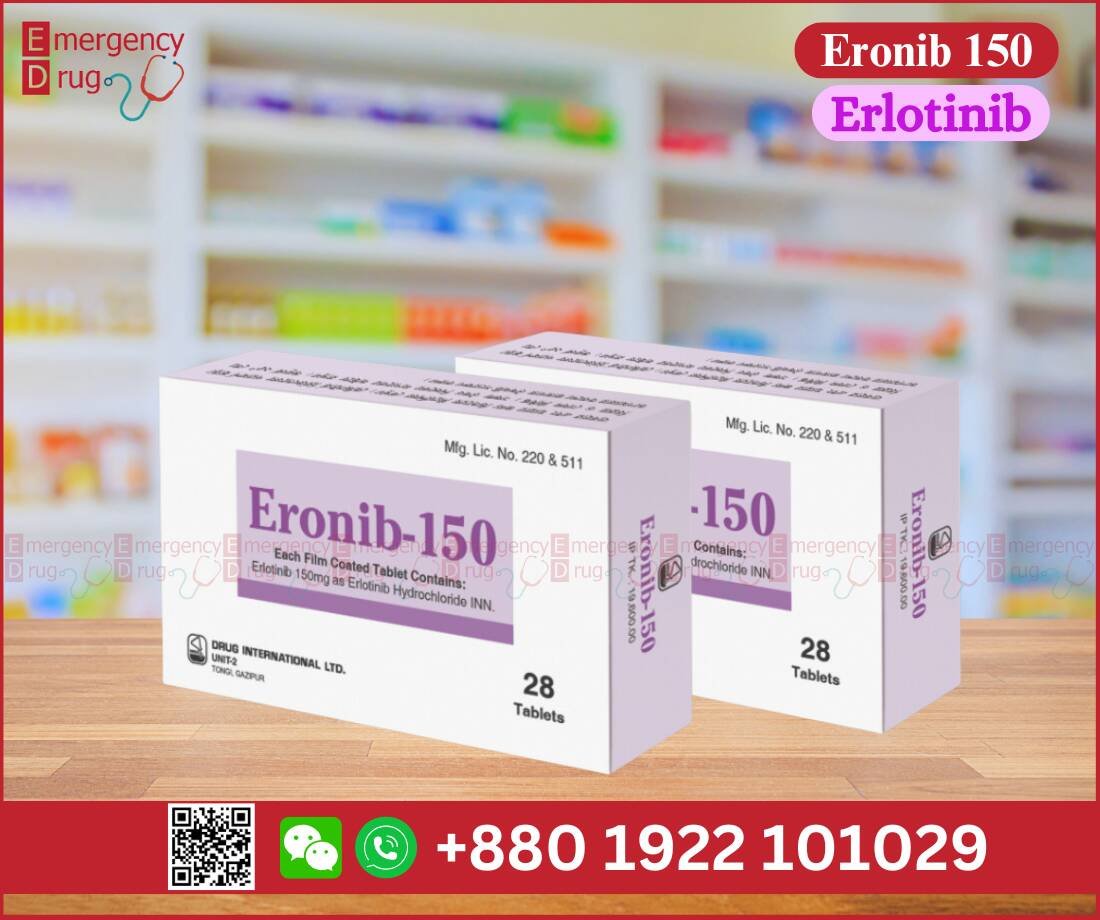Erlotinib
Erlotinib
Showing all 2 results
Erlotinib: This EGFR Drug Could Change Lung Cancer Forever
Erlotinib is a tyrosine kinase inhibitor used for the treatment of non-small cell lung cancer (NSCLC) and pancreatic cancer. It works by targeting the epidermal growth factor receptor (EGFR) to inhibit tumor growth and progression.
Core Indications
-
Non-Small Cell Lung Cancer (NSCLC)
-
First-line treatment for EGFR mutation-positive metastatic NSCLC (exon 19 deletions/exon 21 L858R).
-
Maintenance therapy after platinum-based chemo in unselected advanced NSCLC.
-
-
Pancreatic Cancer
-
Combined with gemcitabine for locally advanced/metastatic disease (after failure of prior chemotherapy).
-
Mechanism of Action
-
EGFR Tyrosine Kinase Inhibitor (TKI):
Blocks the intracellular tyrosine kinase domain of Epidermal Growth Factor Receptor (EGFR), inhibiting:
→ Tumor cell proliferation
→ Angiogenesis
→ Metastasis
Biomarker Testing Requirement
-
Mandatory for NSCLC: EGFR mutation testing (tissue biopsy or liquid ctDNA) before initiation.
-
Not required for pancreatic cancer (used empirically in combination therapy).
Dosing & Administration
| Indication | Dosing | Key Instructions |
|---|---|---|
| NSCLC (monotherapy) | 150 mg orally once daily | Take on an empty stomach (1 hour before/2 hours after food). |
| Pancreatic (with gemcitabine) | 100 mg orally once daily + gemcitabine | Same fasting requirement. |
Common Side Effects (>20%)
| Side Effect | Management |
|---|---|
| Acneiform Rash (75%) | Topical steroids/antibiotics; avoid sun; dose reduction if severe. |
| Diarrhea (54%) | Loperamide; hydration; dose hold if severe. |
| Fatigue (52%) | Activity pacing; rule out other causes. |
| Anorexia (33%) | Nutritional support; small frequent meals. |
| Nail Changes (14-24%) | Moisturize; avoid trauma. |
Serious Risks
-
Interstitial Lung Disease (ILD):
Incidence: ~1.1%; fatal in 1/3 of cases.
→ Symptoms: Acute dyspnea, cough, fever → Stop erlotinib immediately and investigate. -
Hepatotoxicity:
Monitor LFTs monthly; fatal hepatic/renal failure reported. -
GI Perforation: Rare but high mortality.
-
Ocular Disorders: Corneal ulcers/perforation (report eye pain/redness).
Drug Interactions
-
Avoid PPIs/H₂ Blockers: ↑ Gastric pH → reduces erlotinib absorption by 50%.
→ Use antacids timed separately (e.g., 2 hours before/after erlotinib). -
CYP3A4 Inducers (e.g., rifampin): ↓ Erlotinib levels → risk of treatment failure.
-
CYP3A4 Inhibitors (e.g., ketoconazole): ↑ Erlotinib levels → risk of toxicity.
-
Warfarin: ↑ INR monitoring (bleeding risk).
Key Patient Counseling Points
-
Take on empty stomach: Critical for absorption.
-
Rash ≠ allergy: Often indicates drug activity; don’t stop without consulting doctor.
-
Report immediately:
-
Shortness of breath/new cough
-
Severe diarrhea/abdominal pain
-
Jaundice/dark urine
-
Eye changes
-
-
Avoid sun exposure: Use SPF 30+ and protective clothing.
Clinical Efficacy
-
NSCLC (EGFR+)
-
Response Rate: 60-80% vs. chemo (30%).
-
Median PFS: 9.7-13.1 months (vs. 4.6-6.9 months with chemo).
-
-
Pancreatic Cancer
-
Adds ~12 days survival benefit vs. gemcitabine alone (OS: 6.24 vs 5.91 months).
-
Summary
Erlotinib remains a cornerstone for EGFR-mutant NSCLC and adjunct in pancreatic cancer. Strict adherence to fasting dosing, proactive toxicity management (especially rash/ILD), and avoiding pH-altering drugs are critical for optimal outcomes. Biomarker testing is essential in NSCLC to identify responders.


